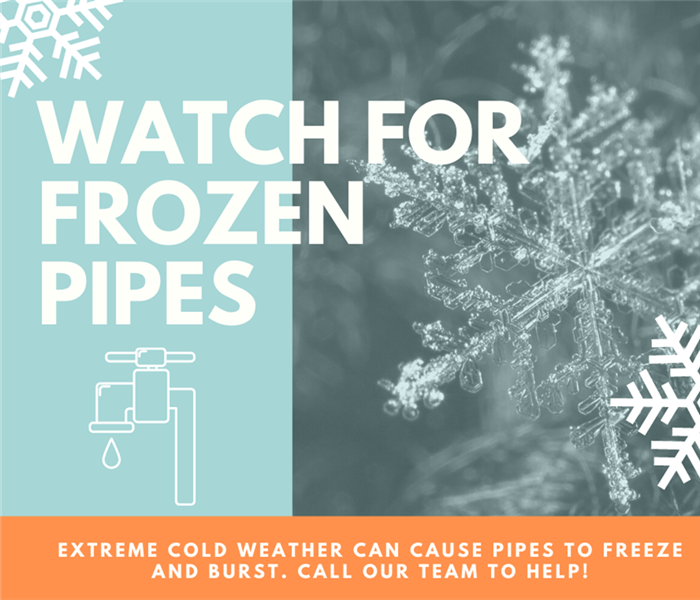What to do about frozen pipes
2/18/2021 (Permalink)
 A burst pipe can cause a lot of water damage, so call on our team when you are experiencing the damage in your home or business.
A burst pipe can cause a lot of water damage, so call on our team when you are experiencing the damage in your home or business.
Frozen pipes can cause a lot of issues and cost a lot of money! One pipe burst in a home at 4-8 gallons of water running per minute. This can cause thousands of dollars worth of water damage. If not taken care of and mitigated properly, then this can then lead to mold issues.
Prevention:
- Locate and identify any and all shut off valves in the home and make sure they work properly. (Everyone should know where their "Main Water Valve" is at and how to operate it)
- Identify any potential problems. (Areas where pipes are on an outside wall, ceiling, attics, crawl spaces, etc)
- Seal any gaps around the home where cold air has a chance to come in contact with pipes. In extreme cold temperatures, especially wind driven, even a tiny opening can let enough cold in to cause a pipe to freeze. (Dryer vents, windows, cable penetrations, etc.)
- Turn off and drain all standard outside hose bibs.
When the temperature is expected to drop:
- Open kitchen sink and any vanity doors of the areas that are at risk for problems.
- With pipes that are on outside walls that may be a freeze problem, leave a small trickle of both of the hot and cold water running.
- Temporarily seal off any crawl space vents that may be around the foundation.
- Keep the house warm.
What to do if you experience a frozen pipe: (The first sign of a "frozen" pipe is reduced or no flow at all)
- If you experience a "no flow" situation (First turn off the "Main Water Valve" to the house and leave the faucets "open", Second DO NOT use any open flame to attempt to thaw the pipes, Third DO NOT use any electric heater, hair dryer applied directly to the piping as any leaking water may cause electrocution, and Forth turning the water back on is best handled with (2) people. One person turning on the water SLOWLY and the other walking about the house to be sure no water is running).
- Heat and patience is the best way to get frozen pipes thawed out. We do recommend that if a frozen pipe happens to find the source and correct it so it will not happen again. (If you were lucky enough for the frozen pipes not bursting this time, you may not be so lucky the next time.)
**Please be advised if the water to your house is shut off, it may also turn off any fire prevention system you may have hooked up to your water
What to do if you leave your home during the winter months:
- Turn the Main Water Valve off to your home**
- Leave the heat on to the house and set it NO LOWER than 60 degrees.
- Have a neighbor stop by daily, especially when the temperatures are in the 20's or lower.
**If your home has "hot water and/or steam heat", the water must remain on even when you are not there. A neighbor stopping by is critical if this applies to you.





 24/7 Emergency Service
24/7 Emergency Service